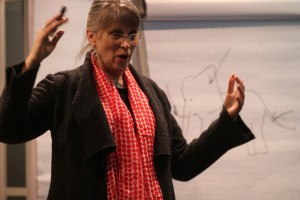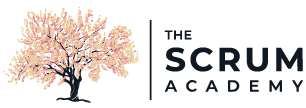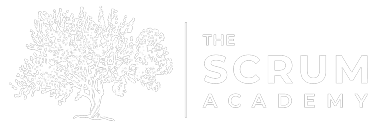I Know How Lonely It Can Be Out Front – Interview with Deborah Hartmann Preuss
 During my consultants retreat in October where we discussed Agile Chartering, I had a chance to collaborate deeply with a dear colleague and friend Deborah Hartmann Preuss, coaching for effectiveness + joy. Deb and I first met way back in 2008 at the very first Agile Coach Camp in Ann Arbor, MI and we have always stayed connected on-and-off via the Internet. In 2012 we reconnected because I was experiencing some trouble focusing in my professional life, I was not entirely satisfied with the results and I recently learned that she was focusing her career in professional coaching. So, I signed up for eight coaching sessions with over five months and our conversations really helped me get the focus I needed. I highly recommend coaching with Deb if you ever feel stuck or in a rut either personally or professionally.
During my consultants retreat in October where we discussed Agile Chartering, I had a chance to collaborate deeply with a dear colleague and friend Deborah Hartmann Preuss, coaching for effectiveness + joy. Deb and I first met way back in 2008 at the very first Agile Coach Camp in Ann Arbor, MI and we have always stayed connected on-and-off via the Internet. In 2012 we reconnected because I was experiencing some trouble focusing in my professional life, I was not entirely satisfied with the results and I recently learned that she was focusing her career in professional coaching. So, I signed up for eight coaching sessions with over five months and our conversations really helped me get the focus I needed. I highly recommend coaching with Deb if you ever feel stuck or in a rut either personally or professionally.
Deb is such an amazing person and has been doing some very interesting things since we first met in 2008. When talking with her in France, I thought she would be the perfect person to include in our interview series. Here is our conversation.
- How did you get involved with the Agile community? Why? In 1998 I was a software consultant on a small team in Montreal, developing a scientific B2B web app. One day, I stumbled across the c2 wiki, specifically, the anti-patterns collection. My appetite was whetted: I was tired of delivering fragile code and half-functional features, and suddenly I saw hope for more transparent, more values-based work. In the following months, I observed that my colleagues had other priorities, that their imaginations were not sparked, as was mine, by the approaches I was discovering.
- What happened next? I left my beloved home city, went somewhere more passionate, ending up on a spirited team where we asked management to let us take over and restart our struggling RUP project – without a traditional project manager, and using Scrum. Astonishingly, they agreed! The memory of that awesome team fuels my work to help others create great work experiences. And the bittersweet aftertaste of losing that job (our team, and others, were laid off en-masse) drove me to develop skills for aligning teams and organizations. It taught me the risks of us-vs-them, and the critical need for building bridges across gulfs and silos to create success for everyone.
- Tell us about your involvement with Agile Coach Camp (ACC)? From 2004 to 2007, I opened space for Joe Rainsberger’s touring XPdays North America. At the NYC event, Naresh Jain and I got to talking about the limitations of the big annual Agile conference. As much as I love the energy there, the community-builder in me balked at the effort expended, and at its expense and exclusivity. Of course: anyone can attend Agile 20xx … anyone who can get leave from work and family, and a big travel budget, that is. Oh, and for whom the timing fits. At XPdays I’d experienced Open Space as an easier-to-plan, more cost-effective alternative that also built up local communities. Open Space is a natural fit for agilists, who are understand the needed balance of freedom and self-discipline required for self-organisation. I think Naresh particularly valued the way it invited innovation and exploration. His experience with SDTconf gave us a huge leg up – inspiring our simplest-possible formula for making it happen without fuss and risk, through community collaboration.
- How was ACC going to be different than the other conferences? We didn’t want to “own” another series of events. So we invited helpers, set up a wiki, held open-invite phone calls and intentionally left a clear trail of breadcrumbs. Ron Jeffries and his co-conspirators secured a venue for us, and so we invited everyone to Ann Arbor in 2008. And then we invited people to run their own! Our dream was of viral, regional events that would spark growth, innovation and community everywhere, between the big annual conferences. That’s pretty much how it’s worked, too. We’ve seen events spring up all over Europe, in Scandinavia, India, North America and Australia. In 2014, I was excited to go back to our roots, opening space with Paul Boos at #ACCUS, attending my first #ACCCA in my home country, and participating in the 40th instance of ACC on the beach in Barcelona! (Please, steal this format! :-) You can read more on how we did it on my blog)
- What are you doing these days? It’s funny, but as it turns out, everything I do seems to be a variation on what I’d call “holding space.” My main passion is to coach change-agents, holding a safe space for them to reflect and find balance, and to experiment with making more resonant, satisfying choices. Most of this is telephone work, and my clients are all over the globe. I also hold space for communities and groups, too, when I open space for their unconferences. I teach others to open space in one-day workshops. The next workshop is immediately before Play4Agile and we are planning one in Ontario [Canada] this June.
- What is new for you right now? I am excited to have recently initiated, together with Steve Holyer and Diana Larsen, a new community of “Agile Chartering” facilitators. You could say we want to help product communities hold vibrant, generative spaces within which to do great work together. I was really happy to see you again in person there, Carlton! The web is great but there’s nothing like face-to-face for collaboration. Oh, and I’m just getting started in 2015 on a totally new and outside-my-comfort zone thing: podcasting!
- What is the connection between your work today and your Agile work? As an Agile Coach, I saw that we do have useful ways to help willing teams work better. But again-and-again I watched teams lose heart at the dysfunctional connections they had with their wider organizations. For this, I felt ill-equipped. So I went looking for new skills, lucked into an inspiring personal coach in Michael Spayd, and ended up studying professional coaching with The Coaches’ Training Institute, Newfield Network and the Center for Right Relationship (i.e. ORSC) in 2008. In the process I discovered that a more effective way for me to apply my intuition and passion was to support the change agents working with and within teams. I can impact more teamwork by helping individual change agents be happier and more effective, who will, in turn, take that renewed energy back to the teams they work with and care about. And I know how lonely it can be “out front” as the change agent: leading the way, seeing possibilities others don’t see yet… the support I offer can be a sanity saver.
- What is coaching? What types of things would not be considered coaching? Such a simple and complex question! The word is used in several different ways, in the business world I’ve worked in, so I will set the context for my answer first. Coaching, also called “life coaching” by some, in its present form was developed in the 1970’s. In the 1980’s, it jelled into a few major schools of coaching. Common elements in all these schools are now embodied in the International Coach Federation’s coaching competencies, code of ethics and include a “no fixing” stance, where the coach supports the client(s) to discover their own strengths, solutions, and sources of inspiration.
- How would define coaching? Coaching is a partnership between a coaching professional and a client (or team) seeking transformation. Clearly, there is overlap here with the Agile process improvement I used to do. However, I now think of coaching as the slower, deeper “teach a person to fish” in contrast with the consulting mindset of “give a person a fish”.
- From your perspective, what are key benefits of coaching? Coaching develops deep, transformative life skills and helps individuals (re-)take control of finding meaning and joy in all aspects of their life. Naturally, this includes their work. When an organisational transformation makes room for this deeper work, I believe culture change will be more profound and change will happen more organically and lastingly. Zappos, with their “Insights” program is an example of this.
- What is coaching? Joseph O’Connor and Andrea Lages in their book, How Coaching Works, give this description, “Imagine a relationship where the total focus is on you … on what you want in your life and on what will help you achieve it … Imagine a relationship with someone who will absolutely tell you the truth … This coaching relationship is one of trust, confidentiality and safety.”
- Why would someone be interested in coaching? People come with motivations from crystal clear (need a new job) to barely-formed (seems like the right time to look inward). These are some common ones I hear:
- You see an important opportunity but can’t get started to make the most of it.
- You feel tired, stressed or over-extended and want a different kind of life.
- The same thing keeps cropping up to irritate you and you want to move past it.
- You are ready to leap into a new challenge and seek support for making the transition.
- You simply feel stale and know the time is right for new growth.
- What is a coaching session like with you? My phone coaching creates a safe space in which to experiment with stepping outside one’s comfort zone, grapple with new possibilities that resonate for the client, and explore stuff that may not yet be “ready for prime time” with colleagues (or family). I don’t even reveal who my clients are, unless they agree that I can and this confidentiality is another way that I “hold space” for clients to explore safely. This work is client-driven, hence the “co” in co-active. Together the coach and client co-create a session, usually for one hour, that uses the client’s problem (or opportunity) to build new perspectives, skills and to open up new possibilities. As each client is different, there can be no templates for this. Of course, I have a toolkit upon which to draw. I use metaphor, body-work (somatics) and visualisation regularly. But my biggest tools are deep listening and Powerful Questions – these two help me co-create with the client the session they need on a given day. It’s kind of like a good retrospective. I have a general, loose framework for a coaching call, within which “whatever happens is the only thing that could.” I follow my intuition to encourage, challenge, champion, appreciate – even provoke – always with the client’s permission, within the professional alliance we’ve designed up front and redesign as needed along the way. Clients usually leave each call with co-designed “homework” – a question to ponder, a task to accomplish, something to read or write – because the real work of coaching happens between calls, when the coaching exploration gets integrated into daily living.
- Do you just talk about Agile stuff and work in a coaching call? Any aspect of the client’s life can come into coaching, as they choose. We can talk about bosses and performance reviews or children and marriages … or not. It can shift from session to session because, you know, s*** happens. We handle what is important as it comes up.
- What are the specific tangible benefits one would receive from coaching? Oh dear, I am hardly neutral on this one. My clients say things like:
- It was amazing how I changed my way of handling difficult situations.
- I found my true passion and profession.
- My wishes and thoughts suddenly turned into actions and I took back control of my life.
- [Our team] has become more compassionate, supportive and in tune with each others’ strengths.
People often come at times of career change, then experience transformation that extends much further. I recently had a client whose initial agenda was “professional branding,” who happily discovered after two months that our work also improved health and family relationships! Coaching is whole-person work, and I don’t buy this “work-life balance” nonsense. Whatever agenda the client comes with is a whole-person agenda and I hold this big agenda while we head in the client’s chosen direction.
- What is your favorite book (or website) on coaching? I’m somewhat dyslexic, so I don’t read nearly as many books as I’d like. But coaching has been such a passion, so I do have a couple I can recommend. While deciding whether to invest in a coaching education, and which one, I found How Coaching Works helpful to understand the field. I opted for Co-Active coaching (among others) and found their approach down-to-earth, powerful, and aligned with my values. The key book there is Co-Active Coaching: Changing Business, Transforming Lives, a recognised reference text for the coaching discipline. But as an experiential learner, I must add that I read it in conjunction with their certification program, which made it come alive in a really deep way. One book I dip into for new ideas these days is Facilitative Coaching: A Toolkit for Expanding Your Repertoire and Achieving Lasting Results. It’s kind of cool because it integrates ideas from Roger Schwarz’s Mutual Learning Leadership model, another subject I’m interested in these days. Perhaps one of the most quietly powerful influences in the past two years has been The Tao of Holding Space, a free e-book from Chris Corrigan. I loved it so much I created a card deck from it, that I use in my Open Space Facilitation workshops.

